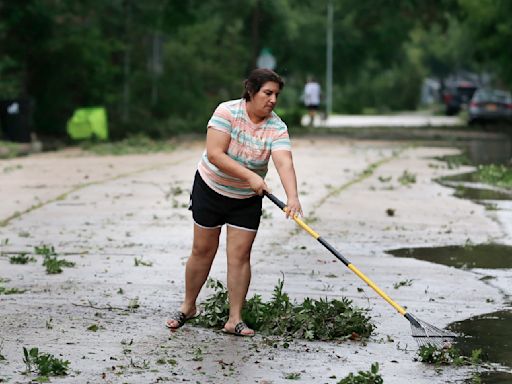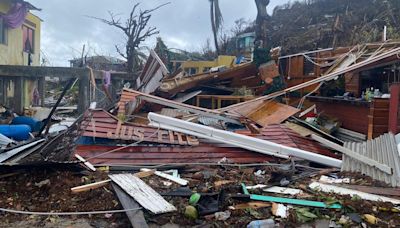Ad
related to: Global warmingDeveloping Scalable Technologies to Help Address Climate Change. Advancing Lower-Emission Energy Solutions Through Science And Technology.
Search results
4 days ago · Modern global warming is the result of an increase in magnitude of the so-called greenhouse effect, a warming of Earth’s surface and lower atmosphere caused by the presence of water vapour, carbon dioxide, methane, nitrous oxides, and other greenhouse gases.
17 hours ago · Global temperatures were at record high levels in June for a 13th consecutive month, according to data by the European climate service Copernicus, which is raising the alarm over the warming climate.
Feb 21, 2024 · Global warming causes climate change, which poses a serious threat to life on Earth in the forms of widespread flooding and extreme weather. Scientists continue to study global warming and its impact on Earth.
- Overview
- What causes global warming?
- What are the effects of global warming?
- How can we limit global warming?
The signs of global warming are everywhere, and are more complex than just climbing temperatures.
Our planet is getting hotter. Since the Industrial Revolution—an event that spurred the use of fossil fuels in everything from power plants to transportation—Earth has warmed by 1 degree Celsius, about 2 degrees Fahrenheit.
That may sound insignificant, but 2023 was the hottest year on record, and all 10 of the hottest years on record have occurred in the past decade.
Global warming and climate change are often used interchangeably as synonyms, but scientists prefer to use “climate change” when describing the complex shifts now affecting our planet’s weather and climate systems.
Climate change encompasses not only rising average temperatures but also natural disasters, shifting wildlife habitats, rising seas, and a range of other impacts. All of these changes are emerging as humans continue to add heat-trapping greenhouse gases, like carbon dioxide and methane, to the atmosphere.
2:49
When fossil fuel emissions are pumped into the atmosphere, they change the chemistry of our atmosphere, allowing sunlight to reach the Earth but preventing heat from being released into space. This keeps Earth warm, like a greenhouse, and this warming is known as the greenhouse effect.
Carbon dioxide is the most commonly found greenhouse gas and about 75 percent of all the climate warming pollution in the atmosphere. This gas is a product of producing and burning oil, gas, and coal. About a quarter of Carbon dioxide also results from land cleared for timber or agriculture.
One of the most concerning impacts of global warming is the effect warmer temperatures will have on Earth's polar regions and mountain glaciers. The Arctic is warming four times faster than the rest of the planet. This warming reduces critical ice habitat and it disrupts the flow of the jet stream, creating more unpredictable weather patterns around the globe.
(Learn more about the jet stream.)
A warmer planet doesn't just raise temperatures. Precipitation is becoming more extreme as the planet heats. For every degree your thermometer rises, the air holds about seven percent more moisture. This increase in moisture in the atmosphere can produce flash floods, more destructive hurricanes, and even paradoxically, stronger snow storms.
The world's leading scientists regularly gather to review the latest research on how the planet is changing. The results of this review is synthesized in regularly published reports known as the Intergovernmental Panel on Climate Change (IPCC) reports.
A recent report outlines how disruptive a global rise in temperature can be:
•Coral reefs are now a highly endangered ecosystem. When corals face environmental stress, such as high heat, they expel their colorful algae and turn a ghostly white, an effect known as coral bleaching. In this weakened state, they more easily die.
Limiting the rising in global warming is theoretically achievable, but politically, socially, and economically difficult.
Those same sources of greenhouse gas emissions must be limited to reduce warming. For example, oil and gas used to generate electricity or power industrial manufacturing will need to be replaced by net zero emission technology like wind and solar power. Transportation, another major source of emissions, will need to integrate more electric vehicles, public transportation, and innovative urban design, such as safe bike lanes and walkable cities.
(Learn more about solutions to limit global warming.)
One global warming solution that was once considered far fetched is now being taken more seriously: geoengineering. This type of technology relies on manipulating the Earth's atmosphere to physically block the warming rays of the sun or by sucking carbon dioxide straight out of the sky.
Restoring nature may also help limit warming. Trees, oceans, wetlands, and other ecosystems help absorb excess carbon—but when they're lost, so too is their potential to fight climate change.
Ultimately, we'll need to adapt to warming temperatures, building homes to withstand sea level rise for example, or more efficiently cooling homes during heat waves.
Scientists attribute the global warming trend observed since the mid-20 th century to the human expansion of the "greenhouse effect" 1 — warming that results when the atmosphere traps heat radiating from Earth toward space.
Jan 22, 2019 · What is global warming, explained. The planet is heating up—and fast. Glaciers are melting, sea levels are rising, cloud forests are dying, and wildlife is scrambling to keep pace. It has become...
The effects of human-caused global warming are happening now, are irreversible for people alive today, and will worsen as long as humans add greenhouse gases to the atmosphere. We already see effects scientists predicted, such as the loss of sea ice, melting glaciers and ice sheets, sea level rise, and more intense heat waves.



